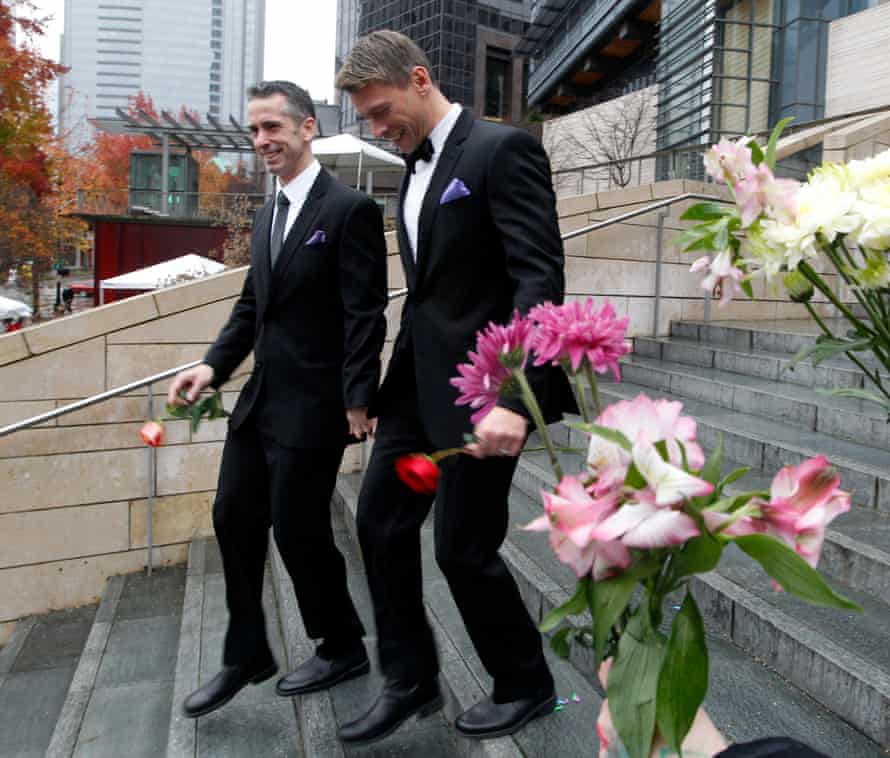Dan Savage is not easily shocked, but recently, well. A few weeks ago he got a letter. A 24-year-old man wanted advice – he’d taken his partner, bisexual, older, to meet his parents for what both thought would be the first time. Except, it turned out he’d met them a decade earlier, when he’d joined them for a threesome. On Zoom from Seattle, Savage chuckles darkly and adjusts his cap. “I was like, oh God,” he says. “It’s all my fault! I felt implicated. Because I helped create a world where middle-aged, married, straight couples can have threeways.” He shrugs. He’s right.
His advice column started as a joke; soon it cracked open, and revealed a map to new ways of living. When Savage Love launched 30 years ago in Seattle’s alternative weekly newspaper The Stranger, the idea was that a gay man – Savage, then 26 and working in a video shop – would give sex advice to straight people. “Hey Faggot!” each letter began. Early questions were easy. “Things like, what’s a butt plug? How do you give a good blowjob?” Straight people had always intuited that their gay friends knew more about sex than they did, “which is true, not because gay people are magic, but because we have to communicate about sex. Straight people get to consent and then… stop talking.” “Use your words!” he tells straights today, often. With the 1990s came the internet, and suddenly most of the answers were immediately Googlable. But the letters kept on coming. “Right away, it was no longer a ‘how to’ column but a ‘why?’ Why did they do that? Why did I do this? And what happens now?”
Savage is 57 years old, with cropped grey hair and seal-like eyes, and he talks in full, considered essays, with pauses where you can see a virtual blinking ellipsis as he thinks. While his syndicated columns quickly made him the most influential advice columnist in America, it was his podcast (downloaded by 300,000 people a month) that brought him to the attention of the rest of the world, along with the It Gets Better Project. In 2010, after a number of gay teenagers killed themselves, Savage and his husband Terry Miller posted a video to YouTube sharing stories of their evolution from bullied kids to happy adults, who had recently adopted DJ, a son. It gets better, they said. Within a week, 1,000 people had uploaded their own videos; within eight weeks it had climbed to 10,000 (including one from President Obama). A decade later, Savage says, he is used to hearing from people who say, “‘You’re the guy who told us “it gets better” and now look at the world!’ But while it’s not perfect it has gotten better,” Savage sighs, a little itchily. “We always have to fight to make it better still, and fight to keep what we’ve won. One of the criticisms was that it was somehow passive, that we were telling young queer people just to wait, and rescue will come. But if you watch the videos, it’s all people talking about what they did.” There were explanations of the conversations they started with their families, or of how they moved town, or rid themselves of unsupportive friends in order to carve out happier lives. “Sometimes I think young queer people, because they’re not raised by older queer people, have a lack of perspective.”

How does he feel about that message today? “I think it’s borne out by the facts on the ground. It has gotten better but we live in perilous times where things could get worse, and fast, if we don’t fight.” What does that fight look like for him? “It’s a fight for democracy. It’s a fight against authoritarianism and autocracy. Our societies are at stake. And it feels terrifying!” Unexpectedly, he chuckles.
Politics are ironed into Savage’s sex advice. His podcasts begin with a monologue (recent subjects include abstinence-only sex education and anti-vaxxers) then expand into listeners’ questions (“Is it a red flag if the guy I’m dating’s previous relationship was with his own therapist?”, “I’m having trouble using the correct pronouns!”, “Is my dick racist?”), which Savage answers with personal anecdotes and not a flake of judgment. The responses are a delicious blend of raunch and empathy, delivered with wit and the correct amount of rage. He regularly consults experts (such as doctors and sex workers), and in dialogue with his listeners he revisits occasions he thinks he got things wrong (inevitably, for somebody whose job it is to stomp about in taboos and sexuality with vulgar jollity, he has pissed a lot of people off), and frequently rips Republican policies apart. “A right-wing sex advice column would just be the word no, over and over and over again,” he grins. “Although, I’m constantly telling conservative critics that my advice is informed by my Catholic upbringing. If you boil all the Savage Loves down to their essence, you’re left with, ‘Do unto others as you would have them do unto you.’”
He says as much in his new book, Savage Love From A to Z, “a modern guidebook” for “anyone who’s had, is having, or hopes to have sex”. (It looks like a picture book – my seven-year-old picked it up and in a sing-song voice started reading, “A is for Anal…”) And yet, “There’s a strong moral code that sometimes upsets my lefty, progressive queer readers.” It’s a strange position to be in, he admits, with rightwingers complaining he’s an anarchistic hedonist who tells people anything goes, and the far queer left saying he’s a judgmental assimilationist. “When I’m in the middle trying to figure out how to make relationships work. That’s where I’m really conservative.”
From the very start, Savage’s column has enacted a fairly unique form of activism, both insidious and thrilling, with moments that catch you in the guts, and others that require a drink. In one memorable column he talked about growing up gay and in danger. He wrote about the complicated fear that came with going to school beside the park where “gay serial killer” John Wayne Gacy was picking up his victims, then, in his 20s, discovering that a friend, Tony Hughes, had been the 12th victim of the cannibal Jeffrey Dahmer. And then he explained how neither horror could compete with those being inflicted on his community by Aids. “Back then, I wrote about straight people 90% of the time, so the 10% of the time I wrote about the HIV epidemic, or gay people adopting children, or the rights of trans people, straight people would wind up reading them out of a force of habit.”
He’s long received comments from people who say, “Leave politics alone, stick to the sex.” “And my answer is always, ‘Sure, when politicians start leaving sex alone, I will leave politics alone.’” He lists the sex-adjacent politics of America, his voice growing slightly hoarser with every example – the banning of abortion, the persecution of gay people, the persecution of people for their gender identity… “If you write about sex and avoid politics, you’re failing. You’re not doing your job.”

For all his weekly conversations about kinks, polyamory and the ethics, say, of orally pleasuring your masseur, the most shiveringly radical advice he gives is about maintaining a long-term relationship. He and his husband are what he calls “monogamish”, and he often uses their marriage as an example when illustrating a knotty truth about relationships. “One person can’t be all things to another, sexually or emotionally. And yet, we expect our long-term, committed romantic partners to be our best friend, our business partner, therapist and sex partner – it’s too much weight for any one relationship to bear. If you tear down all walls, and you’re just standing there staring at each other across a blasted heath, well, where is the opportunity for desire?” Desire, he says, is about bridging gaps. If you know everything about a person, “if they’re not allowed a zone of erotic autonomy, any privacy, any emotional separateness, so they’re exposed to you, then you lose all desire. And that destroys the relationship.” A breath. “It’s crazy to watch, when what people say they want is on a collision course with what they do, in theory to preserve what they need. Because in the end,” he shrugs, “it destroys.”
One complaint he hears a lot is that he’s an “enemy of monogamy”. “I tell people that if you’re with somebody for 50 years, but he cheated on you once or twice, that was still a good relationship. That’s not me trying to destroy monogamous relationships – that’s me trying to save imperfect monogamous relationships. And all relationships are imperfect. We tell people that cheating is unforgivable. Then we turn around and redefine everything as cheating.” He is clear about this – if cheating includes watching porn, or being friends with someone at work, or keeping your exes’ photos on Instagram, you’re setting a relationship up to fail. He is scornful of the misinformation we share about sex and love, like a belief in “the one”, and every week he hints at the way things could be, if only we could untangle ourselves from the fairytales we’ve been fed.
It’s not just readers who ask for his advice. “I have plenty of ‘physician heal thyself’ moments where Terry or my boyfriend will read back to me advice I’ve given that they think I’m not taking myself.” And he has friends who come to him and say, “‘It’s not fair that you found Terry, I can’t make anything last.’ I always end up talking about the bullshit reasons they dumped their last seven boyfriends. Because what they considered unforgivable? For us, that’s a Tuesday. We’ve had these conflicts too, and bigger ones. And the secret to our success is,” he leans into the camera, “we keep not getting a divorce!”

Here’s his most universal piece of advice: people should have the most narrow definition of cheating as possible, and the broadest definition of sex. “In a way those are in conflict, I know. But couples who have a narrow definition of cheating are less likely to break up over cheating. And couples that have a broad definition of sex are likely to have an active sex life.” But for all his opinions, it’s the glossary he’s created – words he’s birthed to help articulate new and particular aspects of modern sex – that Savage will be remembered for. There’s “monogamish” of course, where a couple are “mostly monogamous”, and pegging (where a woman penetrates a man with a strap-on), or GGG, “good, giving and game” – good in bed, giving equal time and equal pleasure, and game for anything (within reason). There’s “the campsite rule” – older people’s responsibility to leave younger partners in at least as good a shape as they were at the start of the relationship. And there’s “santorum”. In 2003 Savage asked his readers to create a definition for the word in response to then-US senator Rick Santorum’s homophobia, the winning entry defining “santorum” as a frothy byproduct of anal sex. The word quickly displaced the senator’s name on search engines. “These words are going to outlast me by far,” he smiles. “As a writer, I’m very proud.”
Occasionally Savage will be walking through an airport and somebody will approach him in tears. “It’s embarrassing to talk about because it sounds self-aggrandising. But people sometimes say that I saved their life, or their marriage, or they have kids because they read something I wrote and decided that it was possible for them. Those moments make me very uncomfortable, but they’re gratifying too.” And they make him consider who his column is really for. “One person sends a question, then countless people read the answer. But I can’t think about that too much because then I get self-important and sentimental.”
After 30 years, a moment of self-importance is, I think, valid. His advice unpicks not only the problem, but the need for advice itself. Why do we read it? For the joy of rubbernecking, sure, but also to log the answer in case it’s useful one day in our wild and unknown futures, and because it opens hidden doors in the world we thought we knew. It is a rare thing he does, defining public conversations around sex in a generous way, elaborating on what consent looks like, offering a sophisticated and nuanced sex education to a country starved of it, remaining unblinkingly accountable, and also, reminding people that sex is meant to be fun.
He’s not easily shocked, but this week he was sent a problem that rattled him in a very different way to the parents’ threesome. “It was heartbreaking, actually,” – in part, it seems, because Savage’s ethics appeared to have been weaponised against the letter-writer. “My boyfriend is a urophiliac,” she wrote, in cheery language scattered with LOLs. “If he doesn’t get to watch me pee every single time, he gets angry.” A shadow falls over the letter and it gets worse, and worse again, and then worse again, and then it becomes the worst.
“This woman,” Savage explains, “agreed to indulge her husband’s kink, which then became basically a terror campaign being waged against her. She’s saying, ‘I don’t want to kink-shame my husband.’ And she’s so paralysed by the thought of somebody accusing her of ‘kink-shaming’ that she’s been manipulated into a relationship she can’t recognise as abusive.” They’ve just had a baby. “I mean,” he chokes, “These things can get you.” What does it feel like, I ask, to be the person people ask for help with a problem the size of this? “Sometimes it feels dangerous to give good advice.” I wait. “Because, often I’m in the position of telling people to leave someone who may be dangerous. And you know, somewhere in the back of your head you’re like, ‘Hmm, I hope he doesn’t come to my book event and kill me’.” He shrugs.
At the beginning of the pandemic the Savage Lovecast started broadcasting “success stories”. “People who had figured out how to ask for what they wanted, or took pleasure in giving somebody else what they wanted. It’s some really excellent role modelling, and it’s titillating too. We wanted to show people who were…” he says, searching for the word, “happy?” For all the trickiness and woe in his work, it’s this – the glee, the joy, that lingers. He’s proud of the words he’s coined. But After immersing myself in his podcasts for one or two pleasant afternoons, it becomes obvious that while those words resonate, it’s the relationships they illuminate – their possibilities, their boundaries, the walls we didn’t realise we were propping up – and most importantly, Savage’s insistence on approaching them with kindness, that promise a kind of revolution.
Savage Love from A to Z: Advice on Sex and Relationships, Dating and Mating, Exes and Extras, by Dan Savage, is out now (£14.57, amazon.co.uk)